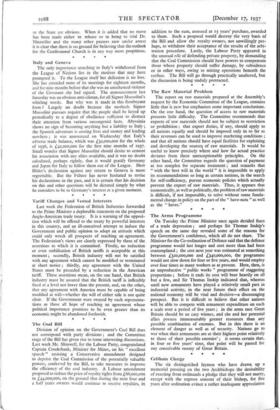* * * * Celibate Clergy The six distinguished laymen
who have drawn up a memorial pressing on the two Archbishops the desirability of exacting from ordinands a pledge that they will not marry, except with the express consent of their bishop, for five years after ordination evince a rather inadequate appreciation of the value to rural parishes (with which their memorial is principally concerned) of married clergy, and in particular of the vicar's wife. Such appreciation should be induced both by reflection and by experience. It is true that all that is advoCated is a postponement, not an abjuration, of mar- riage, but it may be gravely doubted whether the expedient to be thus facilitated—the service of a number of parishes by young unmarried clergy residing in and working from a common centre-would prove in practice beneficial to parochial life. Neither can the alternative suggested—that the priest should live in a cottage_ with his humble parishioners—be readily accepted. Not all parishioners are humble cottagers, and where they are they like to see the vicarage the centre for a variety of parochial activities, formal and informal. To put it briefly, the memorialists appear to undervalue the potential influence of a home. The financial difficulties which prompt their proposals are very real, but it may be questioned whether this is the best way to meet them.















































 Previous page
Previous page